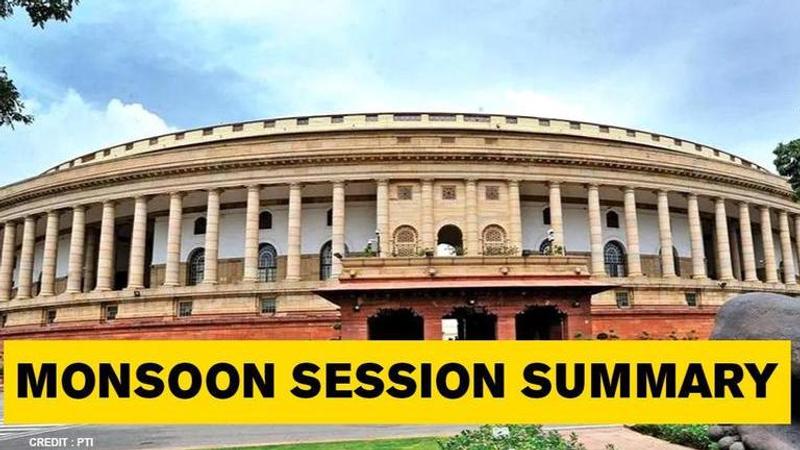Published 22:35 IST, September 23rd 2020
Monsoon session: Parliament passes 17 of 20 Bills in 10 days; LS clocks 145% productivity
Amid the Coronavirus (COVID-19) pandemic, the nation's Parliament held its monsoon session from September 14 to September 23, passing 17 out of 20 bills

Amid the Coronavirus (COVID-19) pandemic, the nation's Parliament held its monsoon session from September 14 to September 23. While it was scheduled to last till October 1 (18 sittings in total), it was cut short after over 30 parliamentarians were infected with the virus. This session also saw unique preparations with both the Rajya Sabha chamber and galleries and Lok Sabha chamber have been used for seating the members during the monsoon session - after they were tested daily for COVID-19.
Productivity of Parliament
Due to continuous sittings and fewer hours of both houses, the productivity of the Lok Sabha stands at 145% and the Rajya Sabha stands at 99% respectively, according to PRS. The Lok Sabha which clocked 58.3 hours spent 34.2 hours on legislative issues. Meanwhile, the Rajya Sabha which clocked 39.5 hours spent 23 hours on legislative issues. Though the parliament was cut short due to COVID-19, the last three days saw the highest numbers of bills pass as Opposition MPs boycotted the Parliament after 8 MPs were suspended for 'unruly behaviour' in the Upper House.
Bills discussed and passed
As per PRS, 20 new Bills were introduced - 14 in Lok Sabha and six in Rajya Sabha. Of the 20 bills introduced, 17 were passed - 12 in Lok Sabha and five in Rajya Sabha. The three Bills - Assisted Reproductive Technology, Factoring Regulation and National Commission for Allied and Healthcare Professions Bill were introduced, but not debated upon. No bills were sent to Standing commission. Five bills from the previous sessions too were passed in this session.
Here are the key bills passed:
The three farm Bills: As the country opened up after lockdown, the Centre promulgated three ordinances - Essential Commodities (Amendment) Ordinance, 2020 & The Farmers (Empowerment and Protection) Agreement on Price Assurance and Farm services ordinance, 2020. The amendment to the Essential Commodities act was to enable better price realisation for farmers by attracting investments - making agriculture sector competitive. Agriculture foodstuff including cereals, edible oils, oilseeds, pulses, onions and potato are to be deregulated while stock limits were to be imposed only under extreme conditions. Under the Farmers (Empowerment and Protection) Agreement on Price Assurance and Farm services ordinance, 2020, it provided a framework for the protection and empowerment of farmers with reference to the sale and purchase of farm products overriding all state APMC laws.
Three Labour codes: Three of the four labour code bills, that comprise the government's labour reforms - condensing the existing 44 labour codes were passed by both Houses, amid Opposition boycott. The Occupational Safety, Health and Working Conditions Code, 2020 deals with setting guidelines for those working in factories, mines and docks and are not universal in nature, leading to unions' boycotting it. Meanwhile, the Industrial Relations Code 2020 allows companies with up to 300 workers to lay off people without the state government's approval and no industrial worker is allowed to go on strike without a 60-day notice. The Code on Social Security, 2020 extends social security funds to workers for app-based firms like Uber, Ola, Swiggy and Zomato apart from the existing labourers. Most states have abolished most labour laws amid the migrant exodus.
Banking Regulation (Amendment) Bill, 2020: The Banking Regulation Ordinance introduced by Finance Minister Nirmala Sitharaman aims in getting all co-operative banks under the purview of the Reserve Bank of India (RBI). The ordinance which has been promulgated on June 26, 2020, aims at tackling the misappropriation of funds amid the PMC Bank scam, PNB Bank scam etc. The Ordinance also excludes primary agricultural credit societies, cooperative societies involved in long term financing for agricultural development from the Act.
Taxation and Other Laws (Relaxation and Amendment of Certain Provisions) Bill, 2020: This Bill was promulgated on March 31, 2020, provides for several relaxations related to compliance, extension, waiver of penalty to certain laws. The Bill includes several clauses related to GST compliances, PM-CARES Fund donations, direct & indirect taxes - which led to a heated debate in Lok Sabha. This amendment was mainly done as the economy shrunk to -23.9% this quarter, leading to severe stress on tax-payers.
Foreign Contribution (Regulation) Amendment Bill, 2020 (FCRA): The Bill which was introduced by Finance Minister (MoS) Nityanand Rai amends the Act regulating the acceptance and utilisation of foreign contribution by individuals, associations, and companies. Tightening the regulations previously amended by the UPA government in 2010, the Modi government has prohibited public servants too from accepting foreign donations. This Bill also prohibits transfer of foreign contribution to any other person, mandates Aadhaar registration, reduces foreign contribution for administrative purposes to 20% and allows suspension of registration upto 360 days.
Time spent on legislation:
PRS also stated that apart from Bills, the session also discussed the COVID-19 pandemic in the country, developments in Ladakh, and steps taken by the government to handle the COVID-19 pandemic. The longest debate in Lok Sabha was on the Taxation and Other Laws where the Lok Sabha clocked in 4.9 hours. Meanwhile, the longest debate in Rajya Sabha was held on the two Farm Bills - which ended in ruckus as Opposition MPs stormed the well, tore the rule book, stood on tables, manhandled marshals - leading to the most contentious bills being passed via voice vote.
Updated 22:35 IST, September 23rd 2020






